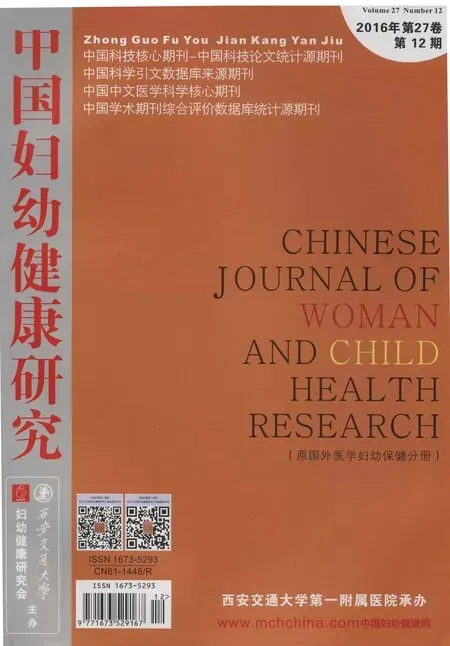孤独症儿童母亲心理健康状况与应对方式研究
李雪宁,赵亚茹
(1.中国医科大学附属第四医院,辽宁 沈阳 110004;2.中国医科大学附属盛京医院,辽宁 沈阳 110004)
【专题研究】
孤独症儿童母亲心理健康状况与应对方式研究
李雪宁1,赵亚茹2
(1.中国医科大学附属第四医院,辽宁 沈阳 110004;2.中国医科大学附属盛京医院,辽宁 沈阳 110004)
目的 探讨孤独症儿童母亲的心理健康状况、应对方式以及两者的相关性。方法 2014年8至12月随机选择沈阳市某孤独症训练中心31例孤独症儿童母亲及同期就诊于中国医科大学附属盛京医院发育儿科的31例正常发育儿童的母亲采用症状自评量表及应对方式问卷进行评定,并对结果进行分析。结果 孤独症儿童母亲症状自评量表的10项各因子分均显著高于对照组(t=2.20~4.55,均P<0.05);应对方式问卷中解决问题及求助因子分显著低于对照组(t值分别为-3.09、-2.04,P<0.05),自责、幻想因子分显著高于对照组(t值分别为2.97、2.70,均P<0.05);研究组应对方式问卷中解决问题因子分与症状自评量表中强迫、焦虑、敌对因子分别呈负相关(r值分别为-0.303、-0.332、-0.380,均P<0.05),自责与症状自评量表中除恐怖外的躯体化、强迫、人际敏感、抑郁、焦虑、敌对、偏执、精神病性及其它因子分均存在明显的正相关(r值分别为0.271、0.488、0.559、0.492、0.304、0.556、0.352、0.292、0.467,均P<0.05),幻想与强迫、人际敏感、抑郁、焦虑、敌对、偏执及其他因子分存在正相关(r值分别为0.313、0.369、0.280、0.256、0.295、0.355、0.275,均P<0.05)。结论 孤独症患儿母亲存在明显的心理健康问题且多采取消极的应对方式。
孤独症;母亲;应对方式;症状自评量表;应对方式问卷
儿童孤独症是一种严重的儿童发育性障碍。由于孤独症发生于幼儿早期且目前尚无有效的特异性治疗方法,孤独症儿童父母往往需要对其进行长期的照顾,期间他们需要面对如经济困难、家庭改变以及对孩子失望等一系列问题。已有研究表明在这些压力作用下,孤独症儿童父母容易产生焦虑、抑郁等心理健康问题[1],面对压力也会采取不同的应对方式[2-3]。目前对孤独症儿童母亲的心理健康状况与应对方式的相关性研究较少,本文对孤独症儿童母亲心理健康状况及应对方式进行了调查,并对两者做了相关性研究,以便为孤独症儿童母亲的心理指导提供依据。
1对象与方法
1.1调查对象
1.1.1研究组
2014年8至12月随机选择沈阳市某孤独症训练中心儿童孤独症患儿的母亲共31例进行调查。孤独症患儿入选标准:符合国际疾病与相关健康问题统计分类第10版(The International Statistical Classification of Diseases and Related Health Problems 10th Revision,ICD-10)儿童孤独症诊断标准。
1.1.2对照组
选取同期于中国医科大学附属盛京医院发育儿科进行健康体检儿童的母亲31例进行调查,排除有发育性及智力问题的儿童。对照组与研究组患儿及患儿母亲年龄、文化程度、家庭结构、职业差异无统计学意义(均P<0.05)。
1.2调查方法
调查形式在安静环境下,由受试者自行填写,测试前采用统一指导语,向家长说明研究的目的及意义,并承诺信息保密。本次收回问卷对照组34份,经检查有效答卷31份,有效率为91.2%。研究组收回问卷31份,经检查有效答卷31份,有效率为100%。
问卷包括一般资料调查表、症状自评量表(SCL-90)和应对方式问卷(coping style questionnaire,CSQ)。
1.2.1一般调查表
由研究者自行设计,包括患儿家长的年龄、文化程度、职业、家庭结构类型及患儿基本情况等。
1.2.2症状自评量表
心理健康水平测查以SCL-90作为测查工具,该量表共包含90个项目,总分能反映被试者症状的严重程度,10项因子反映被试者在躯体化、强迫等10个方面的自觉症状。总分及因子得分越高,表明心理健康水平越差。
1.2.3应对方式问卷
采用应对方式问卷(coping style questionnaire,CSQ)评定两组被试对象的应对方式。该量表共包括62个条目,为自评式问卷,包括解决问题、自责、求助、幻想、退避、合理化6种应对方式。
1.3统计学方法
应用Epi Data 3.2软件建立数据库,将数据导入SPSS 17.0软件进行统计分析。应用独立样本t检验对研究组与对照组心理健康状况和应对方式进行比较;两变量采用Pearson进行相关分析,以P<0.05为差异有统计学意义。
2结果
2.1两组症状自评量表各因子评分情况
研究组各因子分均高于对照组,差异均有统计学意义(均P<0.05),表明孤独症患儿母亲存在较多的心理问题,与发育正常儿童母亲相比容易出现躯体化、强迫、抑郁、焦虑等问题,见表1。
2.2两组应对方式问卷各因子评分情况
研究组CSQ中解决问题及求助因子分均低于对照组(均P<0.05);研究组自责、幻想因子分数均高于对照组(均P<0.05),见表2。
2.3研究组症状自评量表与应对方式问卷评分相关情况
研究组CSQ的解决问题因子分与SCL-90中强迫、焦虑、敌对因子分别呈负相关(均P<0.05);CSQ的自责与SCL-90中除恐怖外的躯体化、强迫、人际敏感、抑郁、焦虑、敌对、偏执、精神病性及其它因子分均存在明显的正相关(均P<0.05);CSQ的幻想与强迫、人际敏感、抑郁、焦虑、敌对、偏执及其他因子分存在正相关(均P<0.05),见表3。


Table 1 Comparison of the score of each factor in SCL-90 between two ±S)


Table 2 Comparison of the score of each factor in CSQ between two ±S)

表3 研究组CSQ与SCL-90各因子分的相关性分析结果(r)
注:*P<0.05,**P<0.01。
3讨论
3.1孤独症患儿母亲的心理健康状况
孤独症目前尚无快速有效的治疗方法,最主要的治疗是功能训练。训练的长期性常常会导致家庭经济负担过重,影响工作,有时甚至出现家庭结构的改变。在面对来自各方面持续的应激下,孤独症儿童父母承受着较大的压力[4-8]。为适应儿童和整个生活的需要,孤独症儿童父母需要付出更多的努力去调整自己的心理状况。既往的研究表明,与正常儿童父母及其它发育障碍儿童父母相比,孤独症儿童父母存在较多的心理健康问题[4、9-10],特别是孤独症儿童母亲,在抚养孤独症儿童过程中要比父亲面临更多的问题,承受更大的压力[11-12]。本研究通过对孤独症患儿母亲的研究发现,SCL-90中各因子分均明显高于对照组,提示孤独症儿童母亲存在较多的心理健康问题,容易出现抑郁、焦虑、人际敏感等问题,与既往[11、13]研究基本相符。
3.2孤独症患儿母亲的应对方式评价
应对方式的准确评价可以帮助了解行为在应激条件下的心理适应意义,并为心理健康教育和治疗干预指明方向。积极成熟的应对方式(解决问题、求助)有助于保持良好的心态和健康的心理状况,消极不成熟的应对方式(退避、自责、幻想)则与之相反。本资料中研究组的解决问题、求助因子分低于对照组;自责、幻想因子分高于对照组,表明孤独症儿童母亲多采取消极不成熟(自责、幻想)的应对方式。本研究结果与周长虹等[2]的研究结果基本相同,而与张轶杰等[3]的研究结果却恰恰相反,其认为孤独症儿童母亲多采取积极的应对方式。研究结果的明显差异可能是随着时间的变化,父母对孩子理解能力的提高及期望值的降低,发展出了更多成功应对的方式[14]。
3.3孤独症患儿母亲的心理健康状况与应对方式的关系
通过对研究组应对方式与心理健康状况相关性的研究,发现孤独症儿童母亲采取的应对方式与心理健康存在一定的联系,采取积极应对方式(解决问题)的孤独症患儿母亲较少产生焦虑、强迫等心理问题,而采取消极应对方式(如自责、幻想)的家长容易产生抑郁、焦虑等诸多的心理问题,此结果与国内一些研究[3]基本相同。相关性研究同时也提示目前孤独症儿童母亲这种消极不成熟的应对方式对心理健康极为不利。
根据目前的研究,孤独症儿童母亲心理健康状况与应对方式等问题必须予以重视。由于父母在孩子的孤独症治疗过程中起关键作用[15],因此给予相应的心理指导及社会支持,使孤独症儿童母亲发展更多积极成熟的应对方式,不仅能够使其保持良好的心态和健康的心理状况,提高生活质量,同时也将有助于改善孤独症儿童训练的预后[16]。
[1]Al-Farsi O A, Al-Farsi Y M, Al-Sharbati M M,etal.Stress, anxiety, and depression among parents of children with autism spectrum disorder in Oman:a case-control study[J].Neuropsychiatr Dis Treat,2016,12:1943-1951.
[2]周长虹,邹华,衡中玉,等.孤独症儿童父母的生活质量与应对方式相关性研究[J].中华行为医学与脑科学杂志,2010,19(12):1113-1115.
[3]张轶杰,杨丽,雷杰鹏,等.孤独症患儿父母的精神症状与应付方式[J].中国心理卫生杂志,2012,26(10):771-774.
[4]陈夏尧,李丹,刘荣莲,等.智力障碍、孤独症儿童家长心理压力及相关因素对比研究[J].中国康复理论与实践,2013,19(6):572-574.
[5]Bluth K, Roberson P N, Billen R M,etal.A stress model for couples parenting children with autism spectrum disorders and the introduction of a mindfulness intervention[J].J Fam Theory Rev,2013,5(3):194-213.
[6]Aman M G, McDougle C J, Scahill L,etal.Medication and parent training in children with pervasive developmental disorders and serious behavior problems:results from a randomized clinical trial[J].J Am Acad Child Adolesc Psychiatry,2009,48(12):1143-1154.
[7]Weiss J A, Cappadocia M C, MacMullin J A,etal.The impact of child problem behaviors of children with ASD on parent mental health: the mediating role of acceptance and empowerment[J].Autism,2012,16(3):261-274.
[8]Ayuda-Pascual R, Llorente-Comi M, Martos-Pérez J,etal.Measurements of stress and family impact in the parents of children with autism spectrum disorders before and after taking part in a training programme[J].Rev Neurol,2012,54(Suppl 1):S73-S80.
[9]彭铃武,陈小燕.孤独症患儿父母的心理特性及社会支持系统的调查研究[J].中国实用医药,2015,10(1):259-260.
[10]Karst J S, Van Hecke A V.Parent and family impact of autism spectrum disorders:a review and proposed model for intervention evaluation[J].Clin Child Fam Psychol Rev,2012,15(3):247-277.
[11]Rezendes D L, Scarpa A.Associations between parental anxiety/depression and child behavior problems related to autism spectrum disorders: the roles of parenting stress and parenting self-efficacy[J].Autism Res Treat,2011,2011:395190.
[12]Cox C R, Eaton S, Ekas N V,etal.Death concerns and psychological well-being in mothers of children with autism spectrum disorder[J].Res Dev Disabil,2015,45-46:229-238.
[13]Rivard M, Terroux A, Parent-Boursier C,etal.Determinants of stress in parents of children with autism spectrum disorders[J].J Autism Dev Disord,2014,44(7):1609-1620.
[14]Bekhet A K, Johnson N L, Zauszniewski J A.Resilience in family members of persons with autism spectrum disorder:a review of the literature[J].Issues Ment Health Nurs,2012,33(10):650-656.
[15]Flippin M, Crais E R.The need for more effective father involvement in early autism intervention:a systematic review and recommendations[J].J Early Interv,2011,33(1):24-50.
[16]黄燕霞,高成阁,赵小艳.心理干预对孤独症儿童父母情绪及儿童康复训练的影响[J].中国妇幼健康研究,2014,25(1):19-22.
[专业责任编辑: 韩 蓁]
Mental health and coping styles of mothers of children with autism
LI Xue-ning1, ZHAO Ya-ru2
(1.The Fourth Affiliated Hospital of China Medical University, Liaoning Shenyang 110004, China;2.ShengjingHospitalofChinaMedicalUniversity,LiaoningShenyang110004,China)
Objective To explore the mental health and coping styles of mothers of children with autism and investigate the relationship between them. Methods Totally 31 mothers of children with autism (study group) were selected randomly from an autism training center in Shenyang during August to December in 2014. And 31 mothers of normal children (control group) who were treated in Shengjing Hospital of China Medical University during the same period were selected randomly. They were evaluated by symptom check list 90 (SCL-90) and coping style questionnaires (CSQ). The results were analyzed. Results The 10 factor scores of SCL-90 in the study group were significantly higher than those in the control group (tvalue ranged 2.20 to 4.55, allP<0.05). The scores of problem-solving and recourse factors of CSQ in the study group were significantly lower than those in the control group (tvalue was -3.09 and -2.04, respectively, bothP<0.05). The scores of self-reproach and fancy factors in the study group were significantly higher than those in the control group (tvalue was 2.97 and 2.70, respectively, bothP<0.05). In CSQ of the study group, the problem-solving score was negatively correlated with scores of compulsion, anxiety and hostility in SCL-90 (rvalue was -0.303, -0.332 and -0.380, respectively, allP<0.05). The self-reproach scores was significantly positively correlated with those of the factors of SCL-90 except for terror, such as somatization, compulsion, interpersonal sensitivity, depression, anxiety, hostility, paranoid and other factors (rvalue was 0.271, 0.488, 0.559, 0.492, 0.304, 0.556, 0.352, 0.292 and 0.467, respectively, allP<0.05). The fancy score was positively correlated with that of compulsion, interpersonal sensitivity, depression, anxiety, hostility, paranoid and other factors (rvalue was 0.313, 0.369, 0.280, 0.256, 0.295, 0.355 and 0.275, respectively, allP<0.05). Conclusion Mothers of children with autism present obvious mental problems, and most of them adopt negative coping style.
autism; mothers; coping styles; symptom check list 90 (SCL-90); coping style questionnaires (CSQ)
2016-05-29
李雪宁(1988-),男,住院医师,主要从事儿童生长发育的研究。
赵亚茹,教授/博士生导师。
10.3969/j.issn.1673-5293.2016.12.001
R395.9
A
1673-5293(2016)12-1431-03

